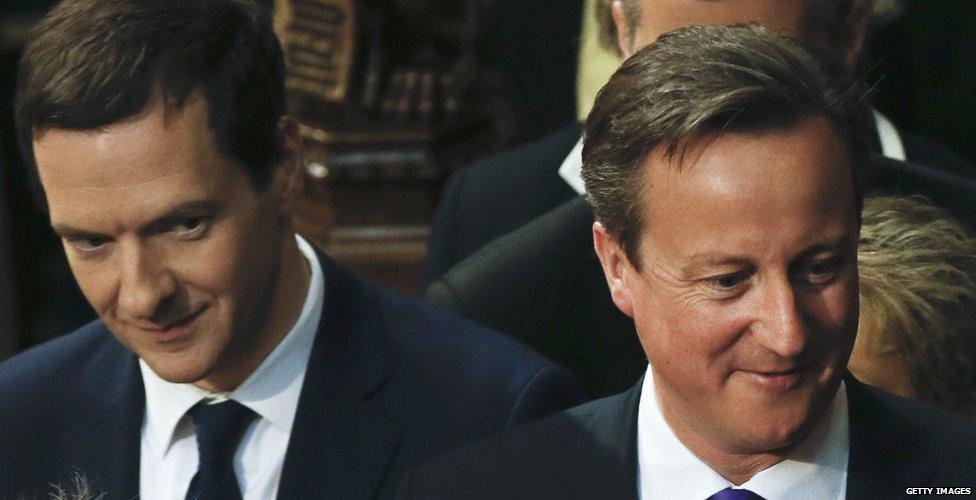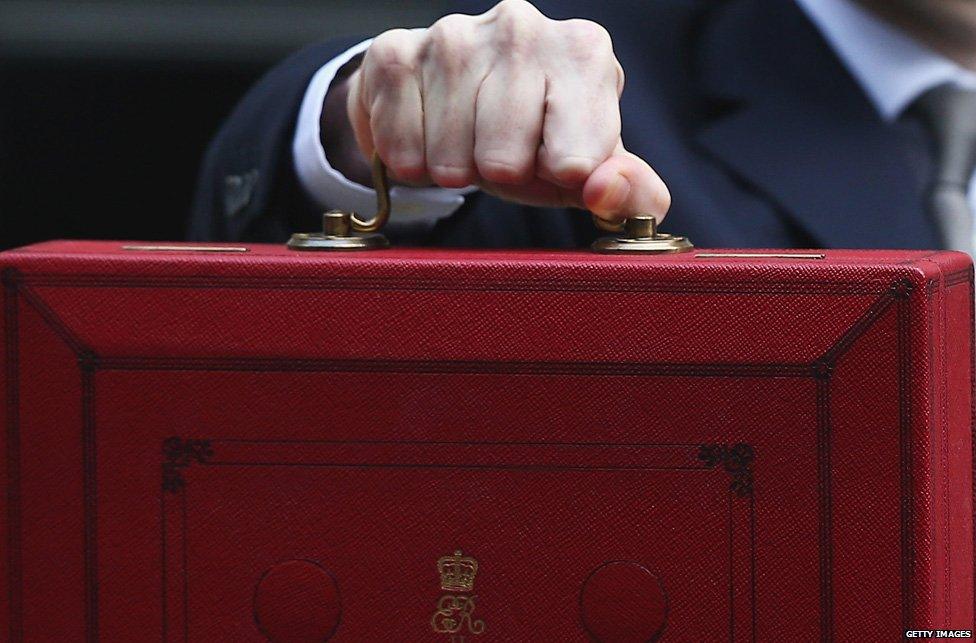A budget that will define this government
- Published
- comments

The big economic and political question for the Prime Minister and Chancellor is whether to get the pain of slashing the deficit out of the way as early as possible in the parliament, and risk significant strife and protest, or adopt a smoother path to putting the public finances on a more sustainable footing.
The politics of all this point in contradictory directions.
On the one hand, the Tories - against almost everyone's expectations, including the Prime Minister's - won a clear overall majority. And there was never any ambiguity during the General Election campaign that the Conservatives would cut harder and faster than the other parties.
On the other, the eccentricities of the British electoral system mean that the Tories' overall majority was won with three quarters of eligible voters not actually voting for them - and their lead in the Commons is slim.
Given the rise of the SNP and UKIP, and the increased fragility of those bonds that hold our nations together, there is an argument that it would not be prudent to give those who hate this government a cause for taking to the streets.
Also, in the plans to make it harder for trade unions to strike, the government has already readied an army of potential protestors against benefit and public-service cuts.
That said, George Osborne might argue that there is momentum in the private sector at the moment, maybe enough to absorb relatively smoothly the negative impact on growth from deeper, earlier public spending cuts.
And it is all very well for the OECD to argue, as it implicitly did yesterday, for a smoother, longer path to deficit reduction. But that could turn into a path to nowhere, if - as can't be ruled out - there is an economic shock in a year or two that would have the automatic effect of swelling the UK's public sector deficit again (through higher unemployment-related benefits and lower taxes).
Better surely, Osborne might say - employing his cliche of choice - to fix the bloomin' roof in sunshine that may be a little cooler than normal but is preferable to the frosts of winter.
Maybe the lesson of the last Parliament - and indeed of Spain right now - is that if you cut deep and early, you create room for the private sector to expand.

And before I am savaged (as I always am) by the Krugman crew of Keynesian economists for even allowing George Osborne's argument an airing, I am not saying that the net negative impact on our national income and living standards of cutting the deficit faster is less than their alternative route of slower so-called fiscal consolidation.
I am simply pointing out that there is a debate here (though Krugman, Wren-Lewis and Portes are utterly persuaded they've won this match - and take the somewhat patronising view that voters who think differently are ignorant sheep led astray by a malign or blinkered media).
All of which is why I regard the emergency budget planned for 8 July, and the spending review of the early Autumn, as the defining economic - and arguably political - events of this parliament.
To remind you what is at stake.
According to calculations by the Institute for Fiscal Studies (which as it happens, the IFS will update today), the Tories' current plans require cuts of 18% to the budgets of unprotected government departments (that is everything apart from health, schools and overseas aid).
Which is a similar scale of shrinkage to the last Parliament.
But that may not be reassuring for this government's new ministers, who have to find these additional savings, because they know the so-called easy cuts have already been made.
Also there is a commitment to make cash reductions to benefits over two years of £10bn - which is less than £15bn of cuts made in the whole of the last Parliament, but the most that was ever saved over two years was £8bn.
And, again, the easy welfare cuts - such as from changing benefits uprating from RPI inflation to lower CPI inflation - have already been made.
So, to tell you what you already know, making further cuts, without being perceived to be harming the innocent and vulnerable, will be a challenge.
Now this plainly matters to all of us. And with David Cameron already announcing that this will be his last term as Prime Minister, it will also probably define how he is remembered - as an Etonian Thatcher, forcing the country to take medicine it may not think it wants or needs, or as the so-called One Nation premier of his recent rhetoric.